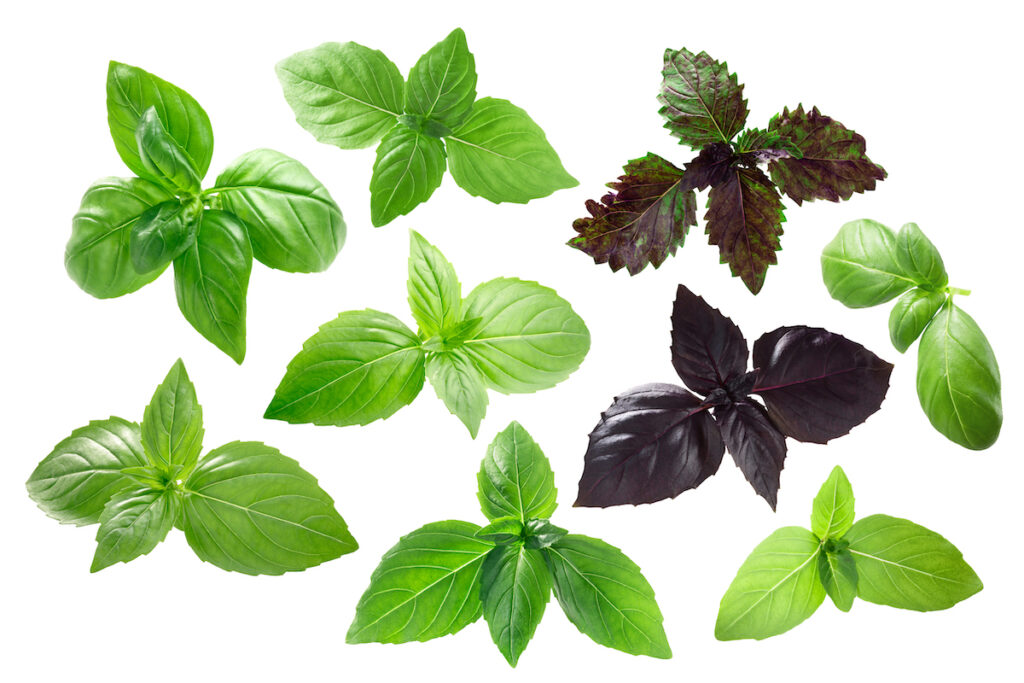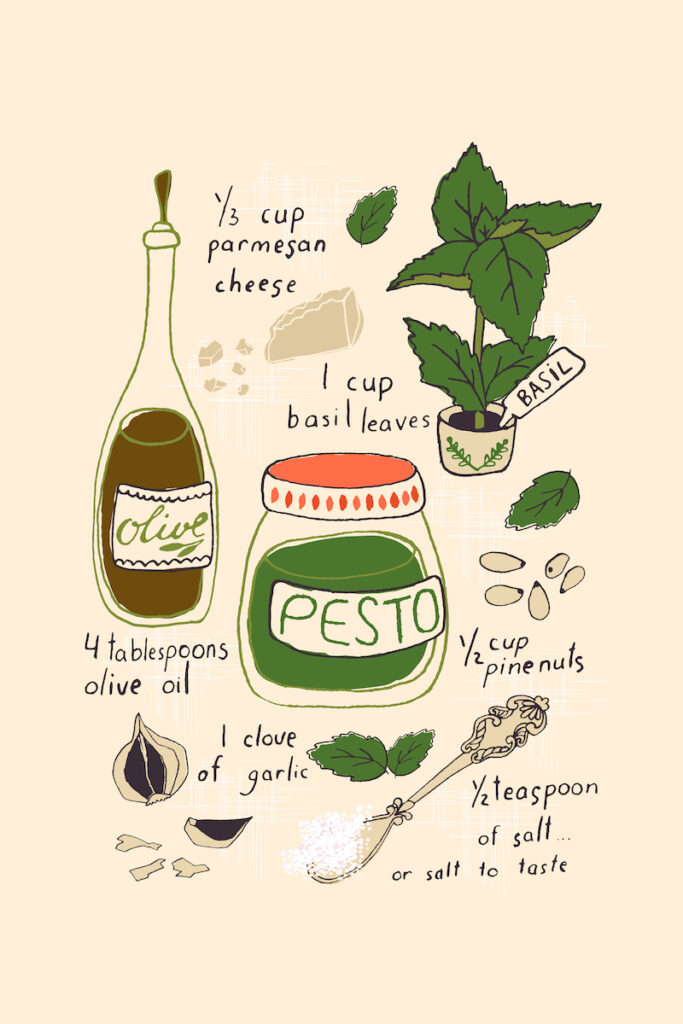As an Amazon Associate I earn from qualifying purchases. This website also participates in other affiliate programs and may earn commissions if you shop through the links used on this website.
(This article was originally published on July 5, 2022 and was last updated on July 13, 2022)
Beloved in pesto and Caprese salads, basil is a king of culinary herbs and widely cultivated around the world.
It is used in countless kitchens worldwide in both fresh and dried forms. And while many in the US associate basil mostly with Italian cuisine, you’ll also find it in plenty of other cultures, including Asian cuisine and many African dishes.
While you’re probably familiar with sweet basil and some of the more common varietals within the basil kingdom, you may not know that your favorite herb has a rich history, filled with adventure, legends, and lore.
Basil Basics
Before diving into the amazing historical background of basil, let’s set the stage. What exactly is basil?
Basil (Ocimum basilicum) is a beautifully aromatic herb and member of the mint family (Lamiaceae).
Some varieties that may be most familiar include Genovese basil, sweet basil, Thai basil, purple ruffles, and lemon basil.

Most commonly known these days for its culinary prowess, basil also plays a critical role in traditional herbal medicine. So you will find it in whole, powdered, and oil form for medicinal purposes.
The word basil most likely derives from the ancient Greek word basileus, which means king.
A royal herb? Seems fitting for this all-star herb!
The History of Basil Goes Way Back
While the history of basil is filled with interesting facts, it’s impossible to pinpoint the exact origin of basil.
Some accounts point to Asia, while others say the basil plant made its way out of India.

We do know that its history traces back over 5,000 years and that, over time, basil started making its way around the world.
Legend has it, basil arrived in the Mediterranean via Alexander the Great after he discovered it during a conquest. While this is possible, it more likely moved through the active and lucrative spice trade.
Basil held a revered standing with both the Ancient Greeks and Romans.
The Greek botanist Theophrastus even mentioned basil in his writings during the 3rd century BC.
Basil also shows up in Roman writings. Pliny touted it as an aphrodisiac, and Lucius Junius Moderatus Columella provided sowing directions.
What About Italy and Sweet Basil?
Often considered the home of basil these days, it may be a surprise that Italy hasn’t been mentioned yet. That is because basil is a relative latecomer to the Italian scene and mediterranean region more generally.
Basil arrived in Italy between the late 11th century and early 12th century. It came to Genoa through a military commander serving in Palestine during the Crusades. While there, he discovered basil and was so smitten he brought it back.
Finding a home in Europe, basil finally became known for its therapeutic and culinary properties during the Renaissance, notably appearing in a 1545 writing by Cosimo de Medici.

The Royal Herb? Basil Had a Sacred Standing Around the World
As basil made its way around, it retained one specific feature in each culture: Its sacred standing.
The belief that basil is sacred, and has almost magical properties, was so strong that nearly every culture had specific guidelines around harvesting basil.
Extensive rituals, rules governing hand washing, and specific clothing expectations reigned.
The Greeks, Romans, Gauls, Egyptians, and Indians believed strongly in protecting their basil plants.
Basil Lore
What is a perusal of history without a dash of lore added?
Historical accounts and ancient records are replete not just with facts, but also with legends and superstitions. Basil is not immune to this and is the subject of countless stories.
While we can’t cover all of them here, we wanted to look at a few of the common mythologies around our beloved basil.
Warding off Evil with Holy Basil and Other Varietals
Many cultures throughout history have employed basil to help ward off evil spirits. Even the name itself conjures up images of evil and monsters. One of the legendary origins of the name basil is “basilik,” a mythical serpent-like monster that could freeze beings with just a glance. Additionally, the French and Latin words for basil mean “monster.”
In India, where tulsi basil is considered sacred, it is used in Ayurvedic medicine and worn or planted outside houses in defense of evil spirits. You can find a similar practice in certain parts of Italy as well.

In the Middle Ages, basil played a role in exorcism rituals. Today, Greek priests still regularly use bundles of basil dipped in holy water to drive out demons.
Basil and Scorpions
Perhaps the last thing that would come to mind when you think of basil is scorpions. On the surface, the two don’t appear to be remotely connected.
However, in the Middle Ages, a common belief was that even smelling basil would grow a collection of scorpions in your brain.
This claim sometimes gets attributed to a Frenchman named Hilarius, but its true origins are unknown.
In an ironic twist, at the same time, Europeans during the Middle Ages regularly used basil to treat scorpion stings.
The Blessing of Basil
Historically, basil has also been associated with bringing blessings and offering protective measures for individuals.
In many areas, basil has shown up as part of funerary or burial rites. There is some lore suggesting Basil plants grew on Christ’s grave.
And in India and eastern Europe, basil would get placed on shrouds and funeral pyres (and often still is!).
Napoleon believed in the power of basil so much that he is said to have used it before planning military action. He credited it with bringing focus and clarity to his mind.
Final Thoughts
So, next time you pass by basil in the grocery store, consider adding it to your cart. It has traveled a great distance over the centuries and will bring a rich history to your kitchen (on top of a phenomenal aroma and flavor).
Jennifer is a writer, Nutritionist, and Herbalist who loves all things food. She grows basil alongside other herbs and edible flowers in her garden. Herbs also hold a prominent space in her aerogarden. She enjoys experimenting in the kitchen, finding fun and unique ways to incorporate herbs into daily life. Jennifer is passionate about helping others discover the joy of quality food. And she loves to bring her two kids along on endless food adventures!

